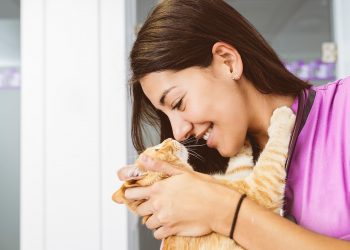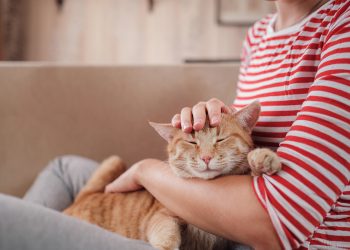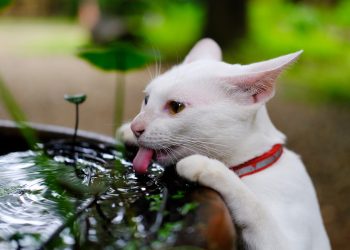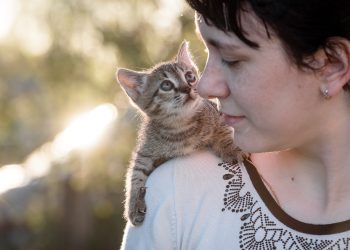What happens if a rabbit eats cat food? Can rabbits eat cat food?
These are the basic questions that we get from rabbit owners who think of making substitutions to their rabbits’ diets. The matter is that rabbits should get rabbit food, and cats should get cat food, not the other way around.
You should only stick to the right types of food and not make sudden changes to your pets’ diets. Sometimes, these sudden changes can cause outright disease in the animals, and you are going to spend even more in having them treated by the vet after. Keep this in mind: the more you change your pet’s diet, the more problematic it gets in the long term.

Can Cat Food Kill a Rabbit?
Yes, cat food, dog food, and other protein-rich items meant for obligate carnivores and omnivores can kill your rabbit, especially in the long term. Emergency feedings notwithstanding, rabbits can only really process plant material properly and not anything else.
Can bunnies eat cat food?
While kitty kibble and bunny kibble look a lot alike, they’re not made of the same ingredients. Bunnies should not be fed cat food at any point in their lives. If you don’t have bunny food at home, we recommend giving your bunny vegetables instead. Just make sure that you wash the vegetable properly before feeding them veggies to your bunny.

Can rabbits eat catnip?
Yes, rabbits can eat catnip. Catnip is not toxic or poisonous to rabbits. However, since catnip has a very distinct smell, rabbits will instinctively avoid eating catnip. This is one of the evolutionary traits that rabbits developed as they adapted to different environments. Plants with strong scents likely harbor compounds that can make them sick, so rabbits will avoid these plants (basically, they won’t risk it because eating poisonous plants will likely make them ill, and they’ll die sooner). But if your rabbit seems to like eating catnip, there’s nothing wrong with you giving it some.
If your bunny shows signs of wanting the catnip, what you can do is chop the catnip and add it to your bunny’s bowl alongside its usual meals. Keep the amount small, as you would limit the amount for your cat.

What Kind of Food Can Kill a Rabbit?
Plenty of things can kill a rabbit, so bunny owners must know their furry friends’ ideal diet. Giving rabbits and bunnies the wrong food can contribute to immediate death, or in some cases, prolonged suffering due to disease.
- Yogurt drops – Even though yogurt drops barely contain any yogurt, it’s not safe to give yogurt drops to rabbits. This product is full of sugar, and scientists state that feeding yogurt drops to rabbits can contribute to more bad bacteria in the rabbit’s digestive tract. Any severe imbalance in the rabbit’s intestinal microbiota can cause diarrhea and related conditions, which can cause a rabbit to become very weak. A rabbit with a compromised immune system can also die from this type of condition.
- Pastry products and bread – Like yogurt drops, the high sugar and carbohydrate content of bread will also cause the overgrowth of bad bacteria in your rabbit’s gut. Enterotoxaemia can put your bunny out of commission fast.
- Avocado – The avocado is one fruit that should never be given to rabbits. It contains compounds that are not healthy for rabbits. The excess fat content is also damaging to the sensitive and specialized digestive system that rabbits possess.
- Cereals – Commercial cereals, trail mix, and muesli are not rabbit-friendly food. Seeds are not exactly part of a rabbit’s diet. Feeding these to your rabbit can cause teeth problems, which can be problematic since rabbits use their sparse teeth for breaking down plant matter. Damaging a rabbit’s set of teeth can be a death sentence in the end.
- Iceberg lettuce – Iceberg lettuce is low in the list of things that can be given to rabbits because it’s virtual water and contributes very little to your rabbit’s diet. Even the calories of iceberg lettuce are almost nowhere compared to other vegetables.
- Hamster food – Yes, we know that you have small hamsters and rabbits at home. Simultaneously, both of them are very fluffy and related (in an evolutionary sense, the nutrition required by hamsters is nothing like the nutrition needed by rabbits. Instead of hamster food, focus on giving your rabbits Timothy hay and other high-fiber plant matter – this is what they need, not hamster pellets. Cross-species diet substations rarely produce a good outcome.

What Do Rabbits Eat?
Think hay – high-quality hay, like Timothy hay. 60% of a rabbit’s diet should be hay, followed by 30% vegetables (fresh), and rabbit pellets can supplement the remaining 10%. This is the ideal ratio, though some rabbit owners stick to just rabbit pellets. Grass hay should be available in unlimited quantities – it should always be available to your rabbits at any time of the day. Please do not feed your rabbits with alfalfa hay, as it might damage your rabbits’ digestive system. Alfalfa hay is known for having high amounts of plant-based protein and calcium. These two can easily wreck your rabbit’s kidneys and liver. As much as possible, we’d like to give our rabbits the food they can process and clear properly.
What about vegetables? Rabbits should also have easy access to leafy vegetables. Root vegetables should only be given in very small quantities as they are rich in carbohydrates, and the excess sugar can cause problems with your rabbit’s digestive tract. It’s fairly easy to spot if something is off with your rabbit’s diet. If you see watery stool, that’s a sign that something in the diet is off.
![]()
Next on your reading list:











